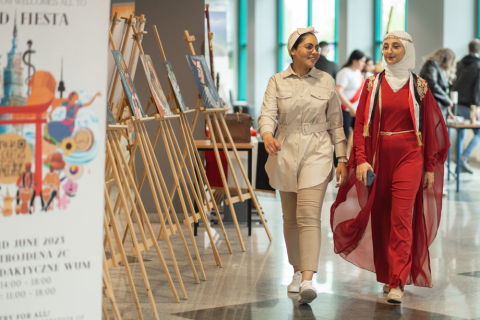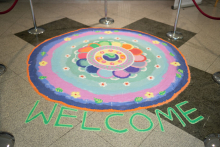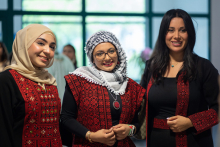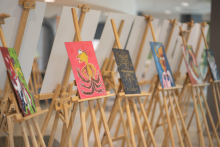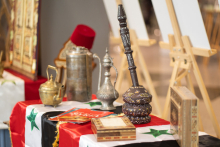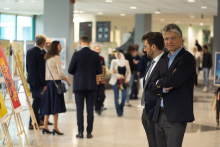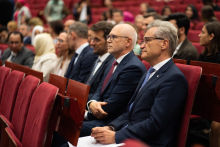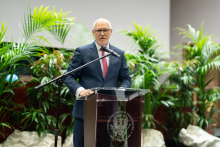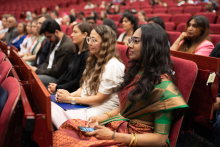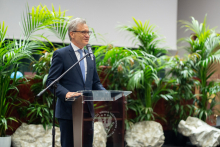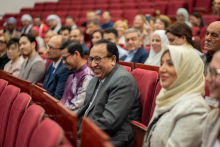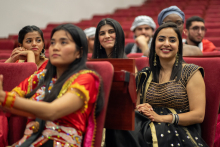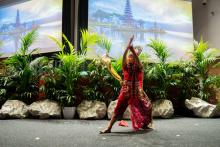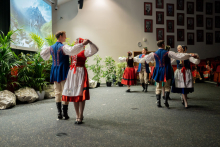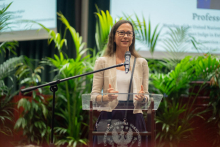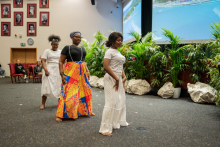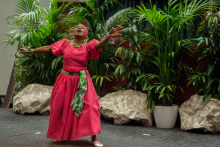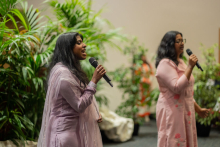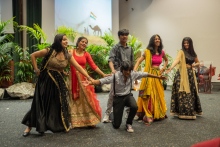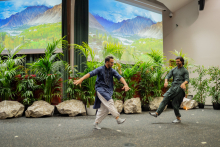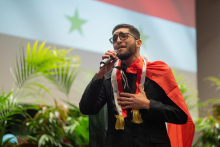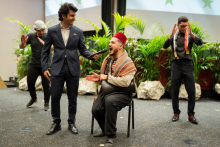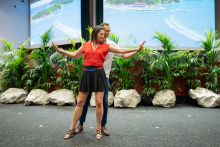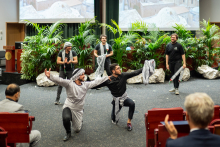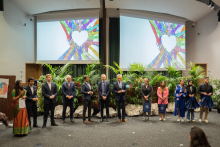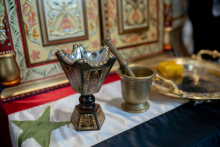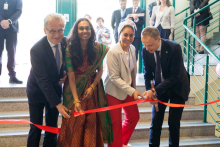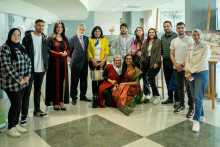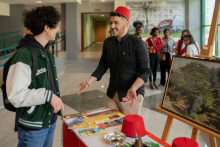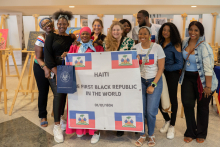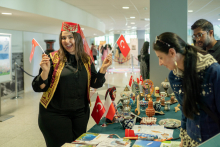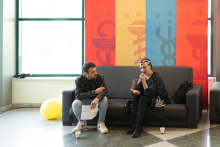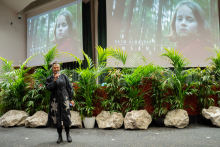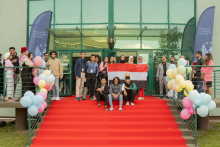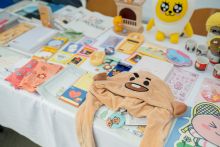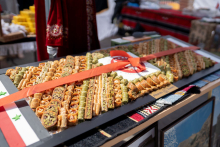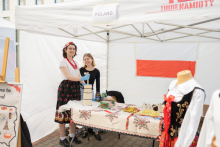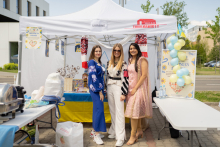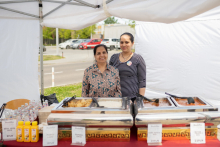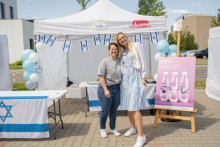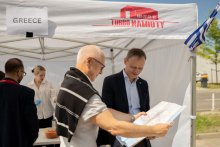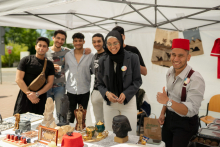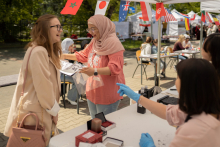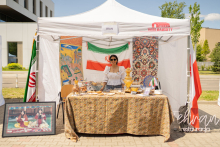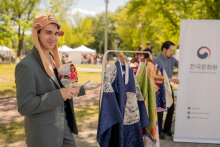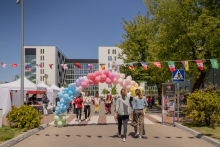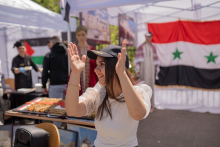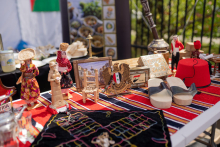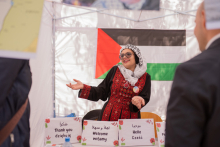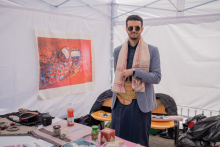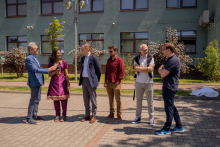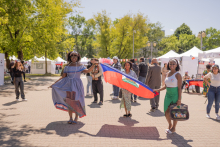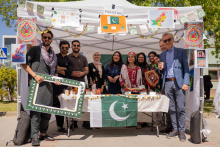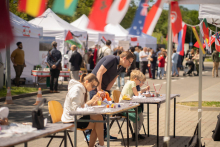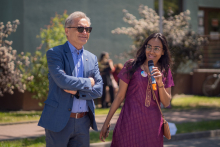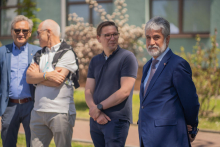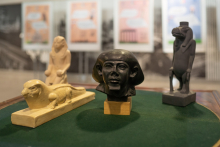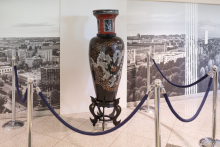The Diversity x WUM project was created to nurture diversity and enable cross-cultural friendships. Nearly 800 foreign students from 70 countries are studying at our university. Wanting to share their culture more widely, they created the Diversity x WUM project. And with the support of the university's authorities, they undertook to organize a two-day Diversity Festival, to which they invited the academic community and residents of Warsaw. During the festival, students from 18 countries presented their customs and traditions.
Diversity not differences
- When we talk about diversity, some people may think that we are talking about differences. And this is absolutely wrong, because we are not different, we are the same - said Rector Professor Zbigniew Gaciong at Friday's opening ceremony of the festival. - But each of us offers a certain diversity, resulting from individual characteristics. Diversity is also related to the country of origin, to tradition, to cuisine, to music, etc. Today we have just had a festival of such diversity, represented by our wonderful students.
The Rector welcomed the ambassadors of various countries who came to the event and all the guests. Together with Prof. Paweł Włodarski, Vice Rector for International Relations, Development and Promotion, he also opened an exhibition showcasing different cultures.
- Medical University of Warsaw has students from as many as 70 different countries, so we need to highlight our presence - said Pratheeba Kumaravel, president of the Diversity Project. - This is a great space for us, not only to make international friends, but also to bring inclusivity to life - in the health care system and around the world.
Multicultural and without stereotypes
On Friday afternoon, June 2, the Didactic Center was bustling with life and an array of colors. The first floor was occupied by an exhibition of traditional costumes, artistic and everyday objects, and publications. The Asia-Pacific Museum provided a large Vietnamese vase from its resources. There was an exhibition of cultural works from around the world. It was supported by various organizations, including the Asoto Foundation, UA Edu Hub, the Asia-Pacific Museum, the Korean Cultural Center and embassies. Is it true that Poles still complain, are Greeks loud, are all Saudi Arabians rich and Iranians not very hospitable - these and other stereotypes were dealt with by our students in the posters they prepared.
A colorful kolam strewn with colored salt appeared on the floor of the Didactic Center. A kolam is a symmetrical pattern that women in India create in front of the entrance to their homes. It is traditionally made of rice, sand or flowers.
Kolam and the poster exhibition can still be seen at the Didactic Center.
In the main auditorium, the students presented an artistic program they had prepared. They conducted the event themselves, played and... danced. There were traditional dances from India, Indonesia, Pakistan, Poland, Ukraine, Haiti, vocal performances by students from India, Syria and Palestine. Finally, there were dance workshops - Indian kathak and Bollywood dance were taught, as well as Greek and Ukrainian dances.
- I would like to express my deep appreciation for the tremendous effort of our students and highlight their contribution to the organization of the event: from the great idea to its performance/execution. Your unflagging enthusiasm and commitment made it possible for us to meet here today. And for this we are very proud of you - said Prof. Rafał Krenke, Dean of the Faculty of Medicine.
During the opening ceremony, guests also heard from Prof. Elżbieta Karska, member of the UN Working Group on Business and Human Rights, Supreme Court judge, professor at the Faculty of Law and Administration at Cardinal Stefan Wyszynski University in Warsaw.
Rasm Almashan, a half-Polish, half-Yemeni singer, songwriter and composer, performed at the invitation of the students. Rasm talked about herself, her story and the music she creates, and premiered the music video for INSANIYA ("Humanity"), a single announcing her second album.
A trip around the world
On Saturday, June 3, students were invited to a truly multicultural tent city. People who visited the Banacha campus in large numbers had a chance to have a great trip around the world - without having to buy plane tickets. And the opportunity to learn about the culture, customs and cuisine of as many as 18 different countries: Egypt, Haiti, Malaysia, India, Pakistan, Yemen, South Korea, Lebanon, Palestine, Syria, Turkey, Taiwan, Greece, Iran, Ukraine, Israel, Peru, and Poland.
At each of the booths prepared by the students, visitors could sample traditional foods or sweets, as well as view jewelry, scarves and traditional clothing, as well as distinctive items and souvenirs.
A culinary workshop was held, during which participants prepared traditional dishes. They were led by students and chefs from Warsaw restaurants. What could be prepared? Among others, Taiwanese mochi, or rice cakes, Malaysian sate, that is grilled chicken skewers, and Pakistani papri chaat, small fried discs of dough called papri with vegetables. One of the most popular dishes of Polish cuisine – pierogi – could not be missed either.
The students also prepared art classes, including mask painting according to South Korean tradition and ebru - derived from Turkey - water painting. And there were language workshops presenting the secrets of Korean and Arabic calligraphy art. The youngest participants of the picnic could try children's games from different parts of the world. Played were: "Batu Seremban" from Malaysia, "7 Stones" from Pakistan, "Takji" from South Korea and "Carom" from India. There was no shortage of music, and the students, accompanied by Prof. Zbigniew Gaciong and Jack Sienko, MD, PhD, danced the Indian dance Nattu Nattu.
- Saturday's picnic and Friday's ceremony were a joint effort by the students, their embassies, NGOs and sponsors, as well as MUW authorities and staff, Pratheeba Kumaravel admitted.
- We are happy that together we were able to organize an event that celebrates diversity, promotes cross-cultural understanding and creates lifelong memories - added Kamila Rutkowska of IFMSA-Poland Warsaw Branch.
Who visited the Diversity Festival
VIP guests: Mervat Mojali, Ambassador of the Republic of Yemen, Mahmud Halifa, Ambassador of the State of Palestine and his wife, Alaa Jadallah, Second Secretary of the Embassy of the State of Palestine, Dr. Khalid Hussain Memon, Ambassador of Pakistan, Syed Muhammad Firdaus, Head of the Chancery of the Embassy of Malaysia, Çağdaş Bilgin, First Counsellor of the Embassy, Deputy Chief of Mission of the Embassy of Turkey; Majd Khirbik, First Secretary of the Embassy of the Syrian Arab Republic; Herbert Ndahiro, Second Counsellor of the Embassy of the Republic of Rwanda, Gladys García Paredes, Minister of the Embassy of Peru; Marcin Witkowski; Assistant for Administration and Finance of the Embassy of Peru; Elena Lagutin, Attaché for Public Diplomacy at the Embassy of Israel, Mateusz Pigoń, Director of the Cultural Department of the Embassy of Israel, Meifen Chen, Director of the Education Division of the Taipei Representative Office in Poland.
And also:
Prof. Paweł Włodarski, Vice Rector for International Relations, Development and Promotion, Prof. Marek Kuch, Vice Rector for Student Affairs and Education, Prof. Rafał Krenke, Dean of the Faculty of Medicine, Jacek Sienko, MD, PhD, Vice Dean of the Faculty of Medicine for English Division Student Affairs, Prof. Aneta Nitsch-Osuch, Vice Dean for Programs and Quality of Education, Ewa Czochrowska, MD, PhD, Vice Dean for International Cooperation and the fields of study: Medicine and Dentistry in English and General and Clinical Speech Therapy, Prof. Elżbieta Karska, Member of the UN Working Group on Business and Human Rights, Judge of the Supreme Court in the Chamber for Extraordinary Review and Public Affairs, Head of the Department of Human Rights Protection and International Humanitarian Law, Faculty of Law and Administration, Cardinal Stefan Wyszynski University in Warsaw, Prof. Urszula Demkow, Department of Laboratory Diagnostics and Clinical Immunology of the Developmental Age.
The event was co-organized by IFMSA-Poland Warsaw Branch. Patronage was assumed by the Rector of the Medical University of Warsaw.
